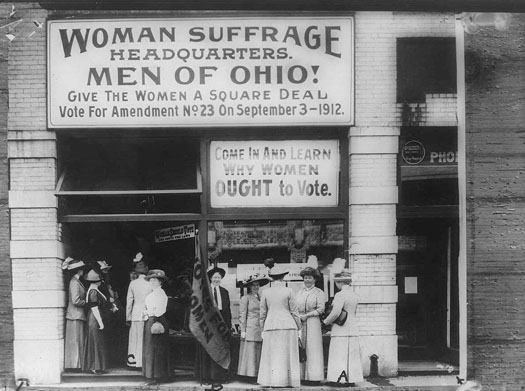| << Chapter < Page | Chapter >> Page > |
Of the remaining amendments, four are of especially great significance. The Thirteenth, Fourteenth, and Fifteenth Amendments, ratified at the end of the Civil War, changed the lives of African Americans who had been held in slavery. The Thirteenth Amendment abolished slavery in the United States. The Fourteenth Amendment granted citizenship to African Americans and equal protection under the law regardless of race or color. It also prohibited states from depriving their residents of life, liberty, or property without a legal proceeding. Over the years, the Fourteenth Amendment has been used to require states to protect most of the same federal freedoms granted by the Bill of Rights.
The Fifteenth and Nineteenth Amendments extended the right to vote. The Constitution had given states the power to set voting requirements, but the states had used this authority to deny women the right to vote. Most states before the 1830s had also used this authority to deny suffrage to property-less men and often to African American men as well. When states began to change property requirements for voters in the 1830s, many that had allowed free, property-owning African American men to vote restricted the suffrage to white men. The Fifteenth Amendment gave men the right to vote regardless of race or color, but women were still prohibited from voting in most states. After many years of campaigns for suffrage, as shown in [link] , the Nineteenth Amendment finally gave women the right to vote in 1920.
Subsequent amendments further extended the suffrage. The Twenty-Third Amendment (1961) allowed residents of Washington, DC to vote for the president. The Twenty-Fourth Amendment (1964) abolished the use of poll taxes. Many southern states had used a poll tax, a tax placed on voting, to prevent poor African Americans from voting. Thus, the states could circumvent the Fifteenth Amendment; they argued that they were denying African American men and women the right to vote not because of their race but because of their inability to pay the tax. The last great extension of the suffrage occurred in 1971 in the midst of the Vietnam War. The Twenty-Sixth Amendment reduced the voting age from twenty-one to eighteen. Many people had complained that the young men who were fighting in Vietnam should have the right to vote for or against those making decisions that might literally mean life or death for them. Many other amendments have been proposed over the years, including an amendment to guarantee equal rights to women, but all have failed.

The liberties of U.S. citizens are protected by the Bill of Rights, but potential or perceived threats to these freedoms arise constantly. This is especially true regarding First Amendment rights. Read about some of these threats at the American Civil Liberties Union (ACLU) website and let people know how you feel about these issues.
What issue regarding First Amendment protections causes you the most concern?
One of the problems with the Articles of Confederation was the difficulty of changing it. To prevent this difficulty from recurring, the framers provided a method for amending the Constitution that required a two-thirds majority in both houses of Congress and in three-quarters of state legislatures to approve a change.
The possibility of amending the Constitution helped ensure its ratification, although many feared the powerful federal government it created would deprive them of their rights. To allay their anxieties, the framers promised that a Bill of Rights safeguarding individual liberties would be added following ratification. These ten amendments were formally added to the document in 1791 and other amendments followed over the years. Among the most important were those ending slavery, granting citizenship to African Americans, and giving the right to vote to Americans regardless of race, color, or sex.
Appleby, Joyce. 1976. “Liberalism and the American Revolution.” The New England Quarterly 49 (March): 3–26.
Bailyn, Bernard. 1967. The Ideological Origins of the American Revolution . Massachusetts: Belknap Press.
Beeman, Richard. 2010. Plain, Honest Men: The Making of the American Constitution . New York: Random House.
Cook, Don. 1995. The Long Fuse: How England Lost the American Colonies, 1760–1785 . New York: Atlantic Monthly Press.
Drinker Bowen, Catherine. 1967. Miracle at Philadelphia: The Story of the Constitutional Convention, May to September 1787 . Boston: Little, Brown.
Ellis, Joseph. 2015. The Quartet: Orchestrating the Second American Revolution, 1783–1789 . New York: Knopf.
Grant, Ruth W. 1991. John Locke’s Liberalism . Chicago: University of Chicago Press.
Knollenberg, Bernard. 1975. Growth of the American Revolution: 1766–1775 . New York: Free Press.
Lipsky, Seth. 2011. The Citizen’s Constitution: An Annotated Guide . New York: Basic Books.
Locke, John. 1689. A Letter Concerning Toleration . Translated by William Popple. http://socserv2.socsci.mcmaster.ca/econ/ugcm/3ll3/locke/toleration.pdf
———. 1690. Two Treatises of Government . http://socserv2.socsci.mcmaster.ca/econ/ugcm/3ll3/locke/government.pdf
Maier, Pauline. 2010. Ratification: The People Debate the Constitution, 1787–1788 . New York: Simon&Schuster.
Morgan, Edward S. 1975. American Slavery, American Freedom . New York: W. Norton and Company.
Szatmary, David P. 1980. Shays’ Rebellion: The Making of an Agrarian Insurrection . Amherst, MA: University of Massachusetts Press.
Urofsky, Melvin I., and Paul Finkelman. 2011. A March of Liberty: A Constitutional History of the United States. Volume I: From the Founding to 1890 . New York: Oxford University Press.
Wood, Gordon. 1998. The Creation of the American Republic, 1776–1787 . Chapel Hill, NC: University of North Carolina Press.

Notification Switch
Would you like to follow the 'American government' conversation and receive update notifications?